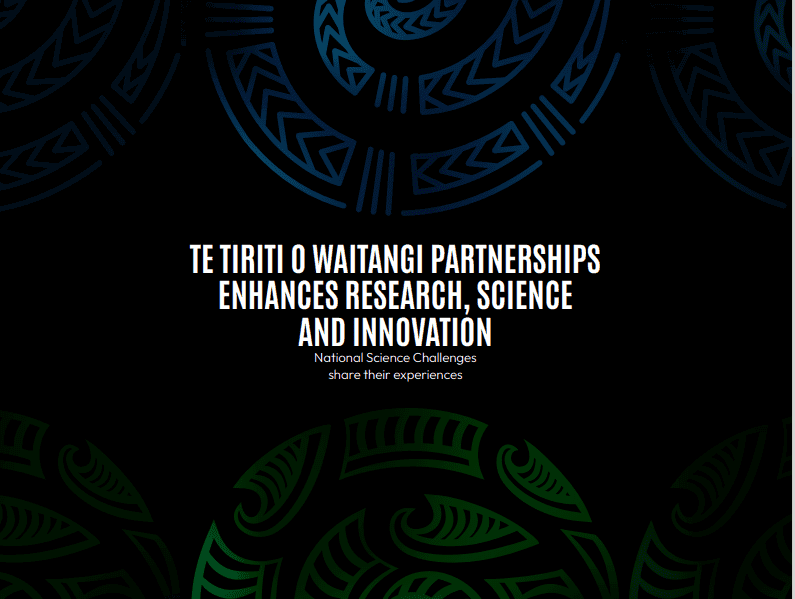Innovation can be accelerated by integrating Te Tiriti o Waitangi principles into the research, science and innovation system, according to a new report recently released by the National Science Challenges. Launched recently in Wellington, Te Tiriti o Waitangi Partnerships Enhances Research, Science and Innovation found that honouring Te Tiriti in research and science fosters more effective and inclusive practices resulting in greater innovation and better outcomes.
The report highlights how the 11 National Science Challenges (NSCs) developed Tiriti-honouring practice. BioHeritage has been regarded by other NSCs, institutes and organisations as a leader in this space. “The examples in the report represent something not seen before, a testament to collaborative efforts between Tangata Whenua and Tangata Tiriti over the last decade,” said Auckland University of Technology Professor Ella Henry, of the Building Better Homes, Towns and Cities (BBHTC) NSC. At this time of uncertainty, they are pivotal to moving forward, she said.
The report emphasizes that meaningful partnerships with Māori communities and weaving mātauranga Māori with other knowledge and research leads to more relevant and impactful outcomes, says Rihi Tenana, Co-Director of BBHTC. The Challenges have pioneered a shift towards honouring Te Tiriti o Waitangi within the RSI framework, emphasising Indigenous knowledge, collaboration with Māori communities, and tangible outcomes that address critical issues facing our nation, she said. “The report commemorates a decade-long journey of transformative partnership and innovation. This journey has been about more than just research; it has been about equity, respect, and genuine partnership. The report celebrates the achievements as well as the lessons learned, and the path forward for research, science and innovation.”
The report highlights key insights and success factors from the NSCs’ collective experience, including harnessing decision-making autonomy and funding flexibility to create impactful research aligned with community needs, and elevating Indigenous knowledge by prioritising mātauranga Māori, and Māori methodologies, to forge innovative solutions to national challenges. Integrating Māori perspectives and expertise enriches the research process and helps address issues in ways that are culturally appropriate and beneficial for all parties involved, says Hōne McGregor, Chair Our Land & Water NSC governance group. “By respecting and incorporating Te Tiriti, researchers and innovators can build stronger, more collaborative relationships that advance both science and social good.”
Co-design and establishing governance structures that value the expertise of both Tangata Whenua and Tangata Tiriti to ensure inclusive decision-making and shared ownership is another key insight from the report, said BioHeritage Co-Director and chair of Resilience to Nature’s Challenges NSC Melanie Mark-Shadbolt. “This report is not just a retrospective piece; it is a roadmap for the future of RSI in Aotearoa.”
BioHeritage, during Tranche 1, clearly stated a set of values to guide their work practice – these values were integrated into the Tranche 2 strategy, and fed into new ways of carrying out research design and scoping, as well as aspects of Māori leadership and knowledge. “The Kāhui Māori were important enablers of this work, generating many of the ideas and leading by example,” notes the report. “Looking back, key personnel say that the chosen values resonated with researchers and mana whenua alike.”
The report notes that Tāngata Whenua helped some Tāngata Tiriti ‘learn on the job’, as some had not had exposure to a Tiriti-based way of thinking while working within mainstream research institutions.
BioHeritage changed to a co-Directorship before the end of Tranche 1, with the Māori Manager moving into a newly created Kaihautū Ngātahi (co-Director Māori) role, followed soon after by a new co-Director (Tāngata Tiriti) coming into the Challenge. This arrangement was unfamiliar territory for the host, Manaaki Whenua, but issues were worked through, and the focus returned to the value and need for diverse ways of knowing and being. Māori co-Leads for BioHeritage’s Strategic Outcomes (programmes) were also put in place, and Māori advisors and Knowledge Brokers were appointed too.
An on-going review of leadership structure ensured BioHeritage ensure they were living their values of addressing inequities, embracing diversity and creating better ways of working collectively. Around the halfway point, the Challenge appointed programme co-leads for Tranche 2 to support Māori and non-Māori to work together more closely and apply different knowledge systems to effect change and enhance innovation. A pivotal moment in BioHeritage’s Tiriti journey was the merging of their Kāhui Māori and Governance to form the Mana Rangatira Governance Group (MRGG).
One example of BioHeritage’s Tiriti-led research that marries Indigenous knowledge with cutting edge research is featured in the report. The Freshwater for our Taonga programme includes two significant kaupapa Māori-led, place-based projects, and complementary research from Canterbury University. For the first, Te Karanga o Ngā Tuna – Mana Whakahaere in Action, Nga Kaitiaki o te Awa, Waikato and Waipaa Tuna, worked together on developing a new three-layer bioprotection system for their elver trap and transfer program. The second project focuses on reversing the decline of mahika kai kanakana. Researchers and Hokonui Rūnanga have co-developed an innovative captive breeding and translocation programme for kanakana (pouched lamprey). While the work is locally focussed, the learnings are applicable in multiple contexts – with knowledge exchange with First Nations communities overseas, and an intergenerational vision for the future health of this important species.
Integrating Te Tiriti principles into the research, science and innovation system can accelerate innovation and research solutions, says BioHeritage Co-director Daniel Patrick. “By activating Te Tiriti-honouring practices, we can accelerate innovation and build a more resilient, inclusive RSI ecosystem for all New Zealanders.”
An updated copy of the report will be available shortly at Home – Building Better.
